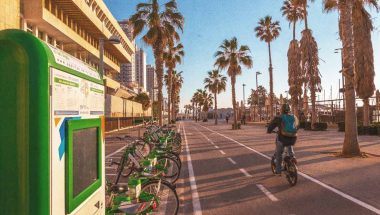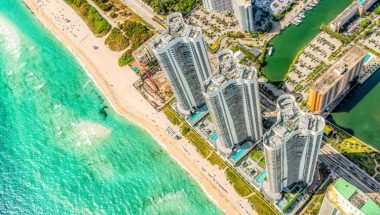Can regenerative tourism shape the future of travel?
And how can it enhance Saudi Arabia's environment, society, and economy?

Imagine a world in 2050 where our natural resources are depleted, and coral reefs and forests have vanished. Our relentless exploitation of the environment would leave us grappling with the dire consequences of our actions.
Over 80% of the value of travel and tourism depends on nature, making this sector key to the conservation and preservation of biodiversity. The travel industry finds itself at a crossroads, and unless we implement a regenerative approach to tourism, there may not be much of the natural world left.
Regenerative tourism, an evolution of sustainable tourism, is what can save us from an ecological disaster. 84% of travelers say they want to visit culturally authentic and ecologically preserved destinations. In addition, 79% of tourists are willing to spend more on businesses that support the local community, and 76% consider it essential for companies in the tourism sector to adopt environmentally responsible practices.
Unlike sustainable tourism, which concentrates on minimizing the negative impacts, regenerative tourism goes further by reviving regions and enhancing the well-being of local communities and the natural world.
“After decades of chronic exploitation, our environment is depleted in abundance and health. Conserving what is already in a weakened state is not good enough,” says John Pagano, Group Chief Executive Officer at Red Sea Global.
There are efforts to conserve and enhance vast amounts of natural reserves so that the environment can regenerate at a steady rate. In the Middle East, developers like Red Sea Global play an important role in reducing the pressure on ecosystems to reduce biodiversity loss and ensure that tourism is regenerative.
“We are pioneering a new model of development that goes beyond simply protecting the natural environment to improving it for future generations to treasure and enjoy,” adds Pagano.
It’s regenerative tourism. It’s an entire paradigm shift.
A regenerative way operates within an ecological living systems paradigm. It prioritizes the social and environmental needs and how tourism, as an industry, can serve them.
A REGENERATIVE APPROACH
The multi-project developer has been actively shaping new tourist destinations, such as The Rea Sea and Amaala, in areas previously untouched by the tourism industry.
But before a shovel hits the ground, scientists conduct a comprehensive cataloging and assessment of the biodiversity in the region.
With the help of large-scale Marine Spatial Planning (MSP), it minimizes environmental disruption, identifies opportunities for enhancement through development, and establishes ecological limits, including visitor capacity.
According to Pagano, Red Sea Global has consciously decided to develop only 22 out of the more than 90 islands within the archipelago.
Within this selection, nine islands have been set aside for conservation purposes. He added that one of these islands possessed the potential for a resort but was also a critical nesting ground for the endangered Hawksbill sea turtle. In deference to the conservation of these creatures, the resort plans were halted.
The company has also set an ambitious target of achieving a 30% net conservation benefit to the area by 2040.
It has initiated several key initiatives to achieve this goal – planting 50 million mangrove trees, establishing a massive landscape nursery spanning one million square meters, and coral gardening projects using innovative floating nurseries to enhance reef habitats.
CHALLENGES AND OPPORTUNITIES
Over the past six years, Red Sea Global has made significant strides, creating exquisite resorts and best-in-class, sustainable infrastructure.
Last month, The Red Sea, which is now open and operational, welcomed its first visitors. The group consisted of Saudi ministers, VIPs, and visionary leaders who were the inaugural guests.
The Six Senses Southern Dunes, the first resort to open at The Red Sea, welcomed guests on November 1. The rooms and suites cover an area of 60 square meters and feature terraces that serve as outdoor living spaces. The villas, offering more space and private pools, include three and four-bedroom options for a private resort-like experience.
Upon full completion in 2030, The Red Sea will comprise 50 resorts, offering 8,000 hotel rooms and more than 1,000 residential properties across 22 islands and six inland sites. The destination will also include luxury marinas, golf courses, entertainment, F&B, and leisure facilities.
Pagano believes that one of the biggest challenges has been tackling unique challenges posed by remote, diverse, and expansive landscapes while ensuring the protection of the environment. Meeting this challenge head-on, the company has had the unique opportunity to build from the ground up, Pagano added.
Saudi Arabia possesses several strengths, including its rich historical heritage and the diverse biodiversity of the Red Sea. However, these assets often remain undiscovered by the global audience.
Pagano emphasizes that their next challenge is to showcase the attractions that Saudi Arabia has to offer. The company has recently launched a destination campaign, inviting people to visit The Red Sea.
THE ROAD AHEAD
Travelers today are increasingly conscious of their environmental footprint. What’s becoming apparent is that they aim to reduce their negative impact and aspire to create a positive difference when they travel.
“We recognize this thirst for a better way to travel, and we understand that we must go beyond providing sustainability-focused products to achieve this,” says Pagano. “Regenerative tourism ensures that tourism has a positive social and environmental impact.”
The regenerative approach centers on revitalizing and enriching ecosystems, uplifting communities, and safeguarding cultural heritage, adds Pagano.
In light of the global climate crisis and biodiversity loss, regenerative tourism emerges as a compelling approach. This perspective emphasizes the imperative of embracing responsible travel.








































